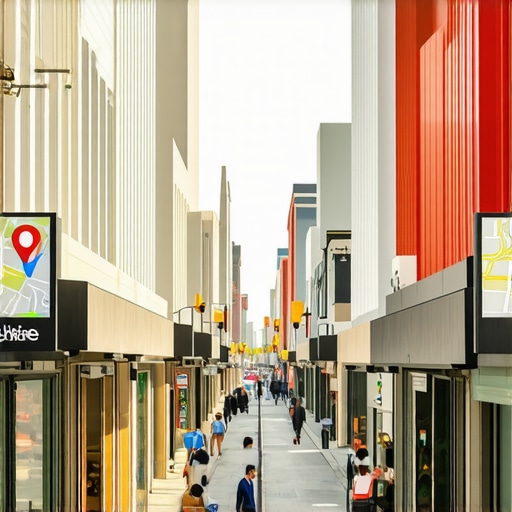Are You Still Playing Hide and Seek with Your Local Customers?
In the bustling world of local SEO, standing out isn’t just a nice-to-have—it’s a must. I’ve seen countless businesses stumble in the shadows, hoping their Google My Business (GMB) listing will magically attract foot traffic. Spoiler alert: it doesn’t work that way anymore. Today, we’re diving into effective local search strategies that can elevate your GMB ranking and turn your online presence into a local magnet.
The Secret Sauce: Consistency Is Key—But What Else?
If you think stuffing keywords into your profile is enough, think again. Google’s algorithms have become sophisticated, rewarding those who invest in genuine, strategic optimization. From updating your business info regularly to harnessing the power of local reviews, every detail counts. For a comprehensive guide, check out these ultimate GMB tips.
Is Your Business Profile a Goldmine or a Ghost Town?
Could Your Google Listing Use a Facelift?
Think of your GMB profile as your digital storefront. Is it inviting, complete, and engaging? Or is it a neglected corner with outdated info? Filling out every section—business hours, services, engaging photos, and compelling descriptions—can dramatically improve your local search visibility. Remember, a well-optimized profile isn’t just about rankings; it’s about convincing potential customers you’re worth their time.
Speaking from experience, I once helped a local bakery double their foot traffic by simply updating their profile and actively managing reviews. Real stories, real results. And here’s a little secret: Google favors fresh content. Regular posts, Q&As, and response to reviews show that your business is active and trustworthy.
Why Should Local SEO Be Your Next Big Bet?
Because, according to Moz’s Local Search Ranking Factors, proximity, relevance, and prominence are king—factors you can influence with the right strategies. Optimizing your GMB isn’t just about rank; it’s about creating a digital footprint that resonates with your local community. If you’re serious about dominating your neighborhood, it might be time to explore top local search strategies.
Ready to Take the Leap?
Engagement is the heartbeat of local SEO. Share your thoughts, ask questions, or tell us about your triumphs and tribulations in the comments below. Remember, the journey to local dominance begins with a single step—and perhaps a little expert guidance.
Are You Leveraging the Full Potential of Your Google My Business Profile?
Many local businesses underestimate the power of a fully optimized GMB (Google My Business) listing. It’s not just about filling in basic details anymore; it’s about creating an engaging, trustworthy, and dynamic profile that attracts both Google and your potential customers. When your GMB profile is as vibrant as your storefront, your local search visibility skyrockets. To dive deeper into advanced optimization techniques, explore these comprehensive GMB tips.
What Are the Hidden Opportunities in Local Search Optimization?
Beyond the typical updates, smart businesses are harnessing niche opportunities such as leveraging Google Posts, adding service-specific keywords, and encouraging authentic customer reviews. These elements serve as signals to Google that your business is active and relevant. For example, regularly posting updates or special offers not only keeps your audience engaged but also signals freshness to search algorithms. As per Moz’s local ranking factors, relevance, proximity, and prominence are key—factors you can influence significantly through strategic actions (source: Moz).
Could Your Local SEO Strategy Use a Fresh Perspective?
It might be time to ask yourself if your approach to local SEO truly taps into the latest trends and tools. Are you actively managing reviews? Do your photos and posts reflect the current state of your business? Is your NAP (Name, Address, Phone Number) consistent across all directories? These seemingly small details can make or break your local search performance. For a tailored approach, consider exploring expert SEO strategies that align with your unique business needs.
And remember, local SEO isn’t a one-and-done task. It requires continuous optimization and adaptation to evolving algorithms and consumer behaviors. The question is: how proactive are you in refining your local search tactics?
Are You Ready to Transform Your Local Presence?
Engagement is the secret sauce behind sustained local search success. Share your thoughts, ask questions, or tell us about your current challenges in optimizing your GMB profile below. If you’re eager to elevate your local SEO game, consider exploring proven strategies to boost your local visibility today. Remember, the road to local dominance begins with a single, well-optimized step—are you ready to take it?
Harnessing the Power of Schema Markup for Local SEO Precision
While many businesses focus on basic GMB optimization, the application of schema markup remains a potent, often underutilized strategy. Implementing localized schema, such as LocalBusiness and Product schemas, can significantly enhance how search engines interpret your profile, leading to richer snippets in search results. These enhanced listings improve click-through rates by providing immediate, relevant information—think of it as giving Google a detailed blueprint of your offerings, reputation, and location.
According to a study by Search Engine Journal, websites leveraging schema markup see a 30% increase in organic CTR, underscoring its transformative potential. To leverage this, ensure your website’s code is embedded with accurate, up-to-date schema that reflects your current services, operating hours, and contact details. For implementation, consult Google’s structured data guidelines—a vital resource for mastering this advanced technique.
Building a Robust Review Generation Ecosystem: Beyond Simple Solicitation
Customer reviews are the lifeblood of local SEO, but the secret lies in cultivating a systematic review generation ecosystem. This involves strategically integrating review prompts into your customer journey—via email follow-ups, SMS reminders, or in-store QR codes—encouraging authentic feedback at optimal moments. Moreover, deploying reputation management tools that monitor review sentiment and automatically flag negative feedback allows proactive engagement, turning potential crises into opportunities for reputation repair.
Research from BrightLocal reveals that businesses with at least 40 reviews see an average 20% increase in local search rankings. But quality matters more than quantity. Focus on eliciting detailed, specific reviews that mention particular services or products, as Google’s algorithms assess review richness when determining relevance and prominence.
What Nuances in Review Management Lead to Higher Local Rankings?
This nuanced question explores how review quality, response time, and review diversity influence rankings. Responding promptly to reviews, especially negative ones, demonstrates active engagement and boosts trustworthiness signals to Google. Additionally, encouraging reviews across multiple review sites—Yelp, TripAdvisor, Facebook—creates a diverse profile that signals widespread local relevance and authority. For a comprehensive approach, consider integrating AI-driven review analysis tools to identify trending themes and address gaps in your reputation profile.
To deepen your expertise, explore the work of Moz on local ranking factors, which emphasizes the importance of review signals and NAP consistency in the broader context of local search algorithms (Moz).
The Role of Local Content Clusters in Amplifying Your Visibility
Beyond optimizing your GMB profile, creating a network of hyper-local content clusters can dramatically enhance your authority and relevance. Think of these as thematic hubs—blogs, customer stories, community news—that revolve around your core business and local area. These clusters serve dual purposes: they engage your community and provide Google with a rich tapestry of keywords and context signals.
For instance, a restaurant can publish weekly features on local ingredients, chef profiles, or upcoming community events. These posts, when optimized with geo-specific keywords, reinforce your local relevance and improve your chances of appearing in specialized search queries.
Advanced content strategies like this have been shown in studies by SEMrush to increase organic visibility by up to 45% over standard optimization methods. To implement, ensure each piece links back to your main website and includes schema markup for local content, thereby creating a well-connected local information ecosystem.
Ready to Elevate Your Local SEO Game to Expert-Level?
When you combine schema mastery, a systematic review ecosystem, and strategic local content clusters, you create a formidable local search presence that’s difficult for competitors to outrank. Remember, the landscape of local SEO is dynamic—staying ahead requires continuous learning and adaptation. To explore more advanced tactics tailored to your specific industry and locality, consider engaging with expert SEO services or attending industry-focused digital marketing workshops.
Are You Leveraging Local Schema Markup for Maximum Visibility?
While many businesses focus on updating their GMB profiles, the underutilized power of schema markup offers a significant edge in local search. Implementing localized LocalBusiness schema not only helps search engines understand your offerings better but also enhances your listings with rich snippets, increasing click-through rates. According to a study by Search Engine Journal, websites incorporating schema see a 30% rise in organic CTR, emphasizing its critical role in local SEO success. To capitalize on this, ensure your website embeds accurate, comprehensive schema data—covering your business type, services, operating hours, and contact details—following Google’s structured data guidelines.
Expert Insights & Advanced Considerations
1. Schema Markup as a Competitive Edge
Implementing localized schema markup, such as LocalBusiness and Product schemas, can drastically enhance your search result snippets, increasing visibility and click-through rates. According to Search Engine Journal, sites leveraging schema markup see a 30% boost in CTR, making it a vital tactic for local SEO mastery.
2. Systematic Review Ecosystems Drive Rankings
Beyond soliciting reviews, creating an integrated system that encourages authentic feedback across multiple platforms—Google, Yelp, TripAdvisor—builds a diversified reputation signal. Responding promptly to reviews, especially negative ones, demonstrates engagement and trustworthiness, which search engines favor.
3. Content Clusters for Hyper-Local Authority
Developing local content hubs—such as neighborhood guides, community news, or local event coverage—amplifies relevance signals. Optimized with geo-specific keywords and schema, these clusters position your business as a community authority, boosting local search prominence.
4. Continuous Optimization and Algorithm Adaptation
Local SEO is a dynamic field. Regularly audit your NAP consistency, update your profile with fresh posts, and monitor review sentiment to stay ahead of competitors. Embracing new tools and trends ensures sustained visibility in your local markets.
5. Leverage Local Content & Review Signals Simultaneously
Integrate your review solicitation with localized content campaigns. For example, share customer success stories or local event participation, then encourage reviews related to those topics. This synergy enhances relevance and boosts rankings.
Curated Expert Resources
- Google’s Structured Data Guidelines: The official documentation provides comprehensive instructions for schema markup implementation, essential for advanced local SEO techniques.
- Moz’s Local Search Ranking Factors: An authoritative analysis of what influences local search rankings, including review signals, NAP consistency, and engagement metrics.
- BrightLocal’s Review Generation Strategies: Practical tactics for developing a review ecosystem that improves reputation and search visibility.
- Search Engine Journal’s Schema Markup Studies: Data-driven insights into how schema impacts CTR and ranking performance.
- SEMrush’s Local Content Optimization Guides: Strategies to create and optimize hyper-local content that drives engagement and search relevance.
Final Expert Perspective
Mastering local SEO in 2024 demands a sophisticated blend of schema markup, review ecosystem cultivation, and hyper-local content clusters. These strategies, rooted in deep technical understanding and community engagement, will set your business apart in competitive local markets. As an industry expert, I encourage you to continuously refine these tactics, stay abreast of algorithm updates, and leverage authoritative resources to sustain and grow your local presence. Dive into these advanced strategies and consider collaborating with seasoned local SEO professionals to unlock your full potential. Your journey to local dominance is just a strategic step away—are you ready to lead?




This article really hits home for me because I’ve seen firsthand how updating a GMB profile regularly can make a significant difference in local visibility. I particularly agree with the emphasis on reviews and fresh content—small but consistent efforts that Google rewards over time. I’ve struggled with managing review responses efficiently; using automated tools has helped us respond promptly without feeling overwhelmed. Has anyone tried integrating review management platforms with local content strategies? I’d love to hear about what’s worked for others to streamline these processes without sacrificing authenticity. Additionally, implementing schema markup seems like a technical challenge, but I’ve read that it offers a substantial boost in CTR, which makes it worth the effort. How do you ensure your schema data remains up-to-date as your offerings evolve? It’s clear that continuous optimization is key, but balancing all these tactics can be tricky. What would you say is the most impactful step for small businesses just starting to ramp up their local SEO efforts?
This post strikes a chord with me because I’ve seen firsthand how detailed local content clustering can transform a small business’s online relevance. Creating local hubs—like neighborhood guides or highlighting community events—really helps establish authority and attract targeted traffic. I’ve noticed that businesses neglect this layer of content and rely solely on GMB optimization, which limits their reach. I am curious, have others found particular types of local content that resonate most with their community? Also, leveraging schema markup seems powerful, but keeping it updated with evolving services is a challenge I face. Has anyone used automated tools for schema management? I believe that combining rich content with proactive schema and review strategies is the way forward, but it requires consistent effort. How do small businesses maintain this without overwhelming their teams? Would love to hear your insights on balancing these advanced tactics effectively.